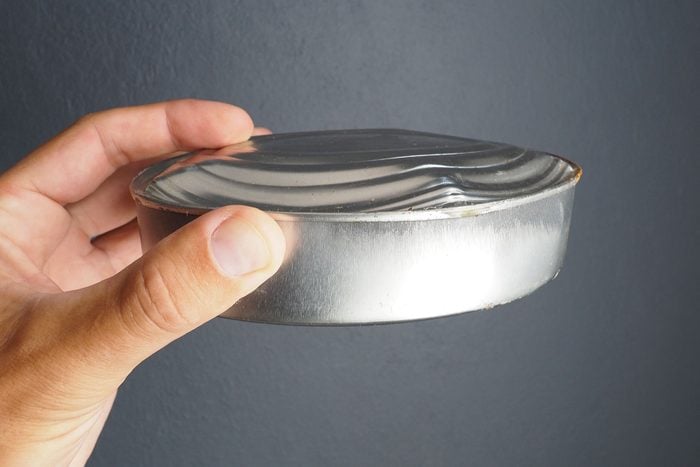The Dangerous Reason You Shouldn’t Eat from a Dented Can
Updated: Oct. 17, 2023

To stay on the safe side, don't ignore that dent. Here's what to know before you open a dented can.
As you look through your pantry for dinner inspiration, you find a can of black beans near the back. The idea for an enchilada bake begins to take shape—that is, until you notice a big dent in the can. Should you toss that can in the trash to avoid food poisoning—or are you free to cook dinner?
To learn whether dented cans are a health hazard to worry about, we talked with two food safety experts. Here’s what you need to know!
Is it safe to eat food from dented cans?
“If the can is dented or damaged along the rim or seam or has a ‘deep dent’—which the USDA defines as a dent you can lay your finger into—then the product can be contaminated with spoilage organisms or worse, foodborne pathogens such as botulism,” says consumer product safety and quality expert Tyler Williams, CEO of ASI Food Safety.
The bacteria clostridium botulinum is a potent neurotoxin responsible for botulism—and even microscopic amounts can cause illness or death, according to the U.S. Department of Agriculture.
“It should be noted that the last case of botulism from commercially canned food is in the 1970s,” says nutrition and food safety expert Toby Amidor, MS, RD, CDN, FAND, author of Up Your Veggies: Flexitarian Recipes for the Whole Family. “If it is botulism—you see it more with bulging cans—the top of the can would appear foamy white.”
However, dented cans from the grocery store can be affected by other contaminants, with some pretty nasty results.
opened a can of peaches and they were black and smelt like fish??
byu/Elly_frog inWeird
Found a dented can on a store shelf? Amidor says it’s best not to purchase it. However, if you dropped a perfectly good can at home and then it became dented, she recommends opening and using that can as soon as possible.
Signs That Canned Food Is Unsafe to Eat
If you’re at the store, avoid cans that are:
- Bulging on top
- Rusty
- Leaking
For safety’s sake, Amidor urges consumers to visually check the contents of each can to ensure that it looks fresh. You want to toss canned goods that are:
- Spurting out liquid or foam when opened
- Foamy white inside
- Filled with food that’s discolored, moldy or has a foul odor
Above all else, know that there’s usually no need to panic about a dent in a commercial can. “In most cases, you are likely fine,” reassures Williams, noting that a damaged can doesn’t necessarily mean the product is contaminated. But if you’ve accidentally eaten food from a dented can and start to feel sick, seek immediate medical attention and inform the doctor about the situation.
